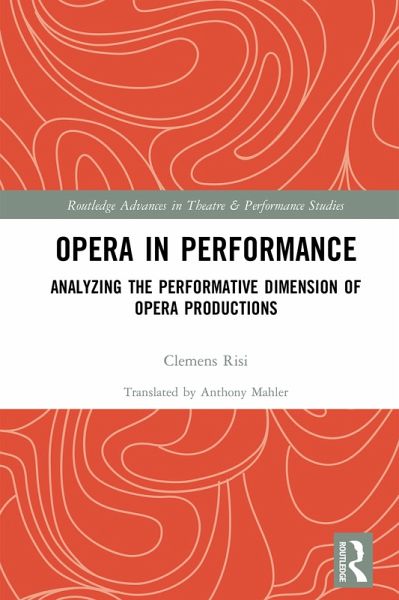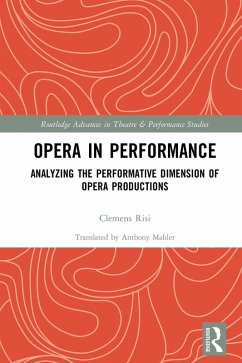
Opera in Performance (eBook, ePUB)
Analyzing the Performative Dimension of Opera Productions
Versandkostenfrei!
Sofort per Download lieferbar
39,95 €
inkl. MwSt.
Weitere Ausgaben:

PAYBACK Punkte
20 °P sammeln!
Opera in Performance elucidates the performative dimension of contemporary opera productions.What are the most striking and decisive moments in a performance? Why do we respond so strongly to stagings that transform familiar scenes, to performers' bodily presence, and to virtuosic voices as well as ill-disposed ones? Drawing on phenomenology and performance theory, Clemens Risi explains how these moments arise out of a dialogue between performers and the audience, representation and presence, the familiar and the new. He then applies these insights in critical descriptions of his own experienc...
Opera in Performance elucidates the performative dimension of contemporary opera productions.
What are the most striking and decisive moments in a performance? Why do we respond so strongly to stagings that transform familiar scenes, to performers' bodily presence, and to virtuosic voices as well as ill-disposed ones? Drawing on phenomenology and performance theory, Clemens Risi explains how these moments arise out of a dialogue between performers and the audience, representation and presence, the familiar and the new. He then applies these insights in critical descriptions of his own experiences of various singers, stagings, and performances at opera houses and festivals from across the German-speaking world over the last twenty years. As the first book to focus on what happens in performance as such, this study shifts our attention to moments that have eluded articulation and provides tools for describing our own experiences when we go to the opera.
This book will particularly interest scholars and students in theater and performance studies, musicology, and the humanities, and may also appeal to operagoers and theater professionals.
What are the most striking and decisive moments in a performance? Why do we respond so strongly to stagings that transform familiar scenes, to performers' bodily presence, and to virtuosic voices as well as ill-disposed ones? Drawing on phenomenology and performance theory, Clemens Risi explains how these moments arise out of a dialogue between performers and the audience, representation and presence, the familiar and the new. He then applies these insights in critical descriptions of his own experiences of various singers, stagings, and performances at opera houses and festivals from across the German-speaking world over the last twenty years. As the first book to focus on what happens in performance as such, this study shifts our attention to moments that have eluded articulation and provides tools for describing our own experiences when we go to the opera.
This book will particularly interest scholars and students in theater and performance studies, musicology, and the humanities, and may also appeal to operagoers and theater professionals.
Dieser Download kann aus rechtlichen Gründen nur mit Rechnungsadresse in A, B, BG, CY, CZ, D, DK, EW, E, FIN, F, GR, HR, H, IRL, I, LT, L, LR, M, NL, PL, P, R, S, SLO, SK ausgeliefert werden.













